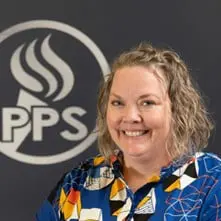 | 1.5 LU |
 | 1.5 LU |
Room: E143-144
Audience: Architects
Call to Action: Take a Stand! Advocate for TID in All Projects. Be a proactive voice to ensure that TID principles guide the creation and design of learning environments, thereby promoting healing and support for those impacted by trauma. Incorporate mindfulness and empathy into your daily activities. Practice and encourage mindfulness and empathy in the classroom or workplace, emphasizing their value in fostering a supportive, trauma-informed environment. Develop opportunities for 4IR – ready learning that is trauma-informed in your school or workplace. Incorporate activities that build emotional intelligence, teamwork, and leadership into technology-focused projects, recognizing that soft skills are equally important in the 4IR workforce.
Abstract: We find ourselves in the thick of the Fourth Industrial Revolution (4IR), a transformative era marked by the confluence of technologies that blur the lines between the physical, digital, and biological realms. In its 2023 Future of Jobs Report, the World Economic Forum noted that the greatest efforts to re-skilling workers are in analytical thinking, resilience, curiosity, self-awareness, and empathy – social-emotional/social brain competencies. Educational systems are called upon to adapt, preparing students for the intricacies of this new age. By utilizing Trauma-Informed Design, schools can equip students with the technical know-how and empower them with the emotional resilience and empathy necessary, to thrive in the complexities of the 4IR. Trauma-Informed Design creates healing-centered learning spaces that support the over 57% of our children who have experienced trauma. The effects of trauma on the brain – especially a hyperactive fight or flight response can inhibit children from learning, thinking critically, collaborating, or being resilient in the face of change. In a revolution that is characterized by leaps in artificial intelligence, robotics, the Internet of Things (IoT), genetic engineering, and quantum computing, it is imperative that our children are resilient, self-aware, and prepared to face a world where the only constant is change. This presentation will examine the intersection of Trauma-Informed Design, Social-Emotional Learning, and the future of learning through the eyes of an educational futurist, a SEL-focused educator, and learning environment designers. We will engage our audience in a hands-on exploration of how TID can create personalized, safe environments for students as they engage in new pedagogies and learning for the 4IR. Support for students who have experienced trauma transcends what is optional or desirable; it has become a categorical imperative.
Learning Objectives:

Dena’s experience as both architectural designer and educator gives her a unique view on the role that space can play in education. She understands teaching and learning pedagogy and is inspired by schools that address not only current best practices, but those that look ahead to “next practices”. A Planner / Programmer at Bassetti Architects, she is also co-leader of Bassetti’s Trauma-Informed Design initiative.

Cole is an inventor, author and ‘comprehensivist’. He has co-designed 23 schools, spoken at over 30 events including a TEDx talk, cowritten policy for the Canadian government, acted as an advisor to 15+ government officials and agencies, and has sat on numerous international boards regarding education and development. His passion for education provides insight into where education is now and where it may be 50 years from now.

Jamie is the Assistant Principal of DART schools, which consists of five different treatment facilities in the Portland Metro area. DART serves students from kindergarten through 12th grade. This is Jamie’s twenty-sixth year in education and twenty-second year with Portland Public Schools. During her time with Portland Public Schools, she has taught at every level of restriction that students could be served at through the IEP process. Jamie has also been a teacher and administrator in opening three of PPS’s new buildings.
Educational Visioning
Exhibits an understanding of best and next practices related to educational leadership, programming, teaching, learning, planning and facility design. Establishes credibility with educators, community members and design professionals while conceiving and leading a community-based visioning process. Demonstrates the ability to articulate the impact of learning environments on teaching and learning and uses that ability to facilitate a dialogue that uncovers the unique needs and long-range goals of an educational institution and its stakeholders – translating that into an actionable written/graphic program of requirements for the design practitioner.